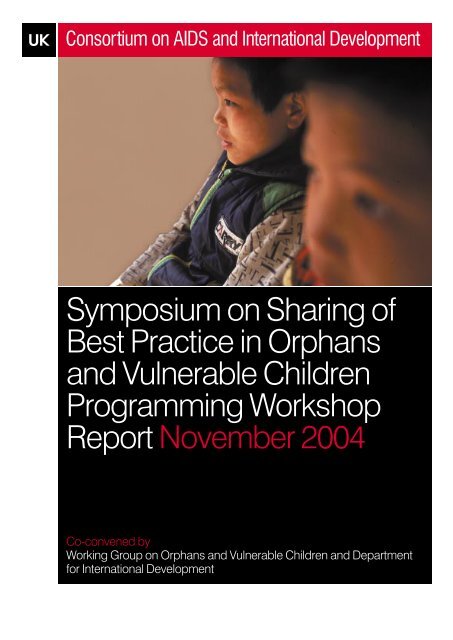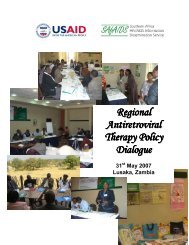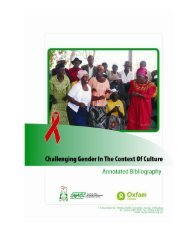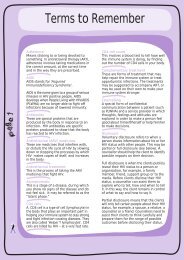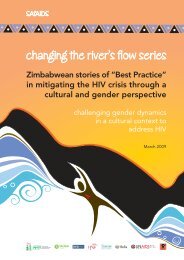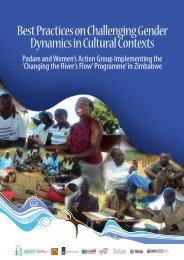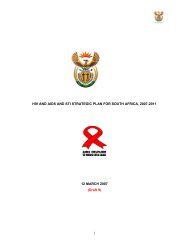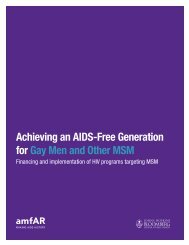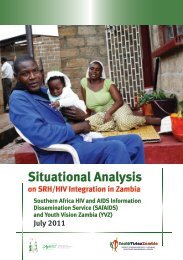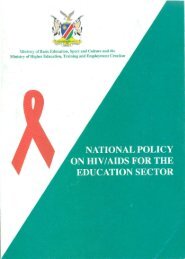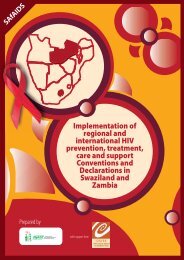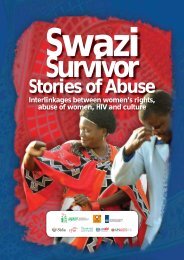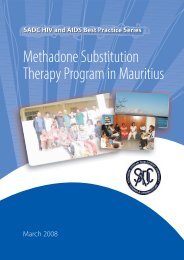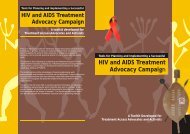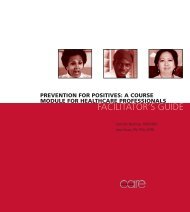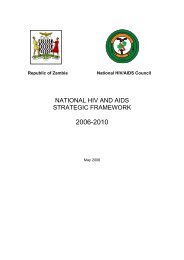2008 05 09 OVC Best Practices.pdf - SAfAIDS
2008 05 09 OVC Best Practices.pdf - SAfAIDS
2008 05 09 OVC Best Practices.pdf - SAfAIDS
You also want an ePaper? Increase the reach of your titles
YUMPU automatically turns print PDFs into web optimized ePapers that Google loves.
Symposium on Sharing of<br />
<strong>Best</strong> Practice in Orphans<br />
and Vulnerable Children<br />
Programming Workshop<br />
Report November 2004<br />
Co-convened by<br />
Working Group on Orphans and Vulnerable Children and Department<br />
for International Development
Table of Contents<br />
UK Consortium on AIDS & International Development<br />
Orphans and Vulnerable Children Working Group<br />
& Department for International Development<br />
Symposium on Sharing of <strong>Best</strong> Practice<br />
in <strong>OVC</strong> Programming, 2 nd November, 2004<br />
Workshop Report<br />
ACRONYMS ............................................................................................................. 2<br />
INTRODUCTION ....................................................................................................... 3<br />
OPENING.................................................................................................................. 4<br />
SESSION 1 – STRENGTHENING THE CAPACITY OF FAMILIES ............................ 4<br />
Healthlink Worldwide: Communicating to Strengthen Family Capacity .................... 4<br />
HelpAge International: Living Together................................................................... 5<br />
Conclusions........................................................................................................... 5<br />
SESSION 2 – MOBILISE & SUPPORT COMMUNITY BASED RESPONSES............ 6<br />
Promising <strong>Practices</strong> in <strong>OVC</strong> Responses................................................................. 6<br />
Strengthening Community Structures ..................................................................... 7<br />
Conclusions........................................................................................................... 8<br />
SESSION 3 – <strong>OVC</strong> ACCESS TO ESSENTIAL SERVICES ........................................ 8<br />
Access to Essential Services.................................................................................. 8<br />
Conclusions........................................................................................................... 9<br />
SESSION 4 - GOVERNMENT PROTECTION OF VULNERABLE CHILDREN..........10<br />
Developing a national social protection strategy in Ghana .....................................10<br />
Responding to <strong>OVC</strong> in a humanitarian aid context in Zimbabwe............................11<br />
Conclusions..........................................................................................................13<br />
SESSION 5 – ADVOCACY & SOCIAL MOBILISATION ...........................................13<br />
Social Inclusion for <strong>OVC</strong>: Learning from Africa and Asia........................................13<br />
Strengthening Social Mobilisation Efforts at the Community Level .........................14<br />
Conclusions..........................................................................................................15<br />
CLOSING.................................................................................................................15<br />
SYMPOSIUM CONTACTS<br />
1
ACRONYMS<br />
CBO<br />
CSO<br />
CSW<br />
DFID<br />
FBO<br />
GoG<br />
GoZ<br />
HAI<br />
IEC<br />
NGO<br />
NPA<br />
<strong>OVC</strong><br />
RAAAP<br />
PLWA<br />
PRSP<br />
PSIA<br />
UK<br />
UN<br />
WHO<br />
Community Based Organisation<br />
Civil Society Organisation<br />
Commercial Sex Worker<br />
Department for International Development<br />
Faith Based Organisation<br />
Government of Ghana<br />
Government of Zimbabwe<br />
HelpAge International<br />
Information, Education and Communication<br />
Non-Governmental Organisation<br />
National Plan of Action<br />
Orphans and Vulnerable Children<br />
Rapid Assessment, Analysis & Action Planning<br />
People Living with AIDS<br />
Poverty Reduction Strategy Paper<br />
Poverty and Social Impact Analysis<br />
United Kingdom<br />
United Nations<br />
World Health Organisation<br />
2
INTRODUCTION<br />
The symposium was co-convened by the Orphans and Vulnerable Children Working<br />
Group and the UK Department for International Development. The Orphans and<br />
Vulnerable Children Working Group is a sub-group of the UK Consortium on AIDS<br />
and International Development and was formed in March 2004. The Working Group<br />
currently comprises nineteen UK based international agencies 1 working, inter alia, for<br />
the rights of children and their families and carers affected by HIV/AIDS around the<br />
world. The group aims to lobby and provide technical support to the UK Department<br />
for International Development (DfID), the European Union, the United Nations, and<br />
bilateral donors in the development of HIV/AIDS related policies and strategies, as<br />
well as to share programme experiences among its members and other interested<br />
parties.<br />
The aim of this symposium was to share experiences and programme approaches<br />
among practitioners working with orphans and children made vulnerable by HIV and<br />
AIDS and their carers. There were presentations to highlight lessons learnt and best<br />
practice related to the five approaches identified in 'The Framework for the Protection<br />
of Orphans and Vulnerable Children Living in a World with HIV and AIDS.’ The<br />
presentations facilitated discussion and assisted with identifying approaches, which<br />
can be scaled up and replicated.<br />
Following an overview of ‘The Framework,’ the symposium consisted of five<br />
sessions: one on each of the five approaches in the Framework. Each included one<br />
or two examples of programme experience based on recent research or evaluations,<br />
followed by plenary discussion time. The day concluded with a round up session to<br />
summarise core lessons and identify some next steps.<br />
We would like to thank the staff of the UK Consortium Secretariat for helping us<br />
organise this event, in particular Penny Bloore for her tireless efforts.<br />
Stuart Kean & Christina D’Allesandro, Co-chairs of the <strong>OVC</strong> Working Group &<br />
David Clarke, Senior Education Adviser, DFID AIDS Team<br />
February, 20<strong>05</strong><br />
1 The Working Group on Orphans and Vulnerable Children members include: AMREF, British Red<br />
Cross, CAFOD, Christian Aid, European Forum on HIV/AIDS, Children, Young People and Families,<br />
Healthlink Worldwide, HelpAge International, Hope HIV, International HIV/AIDS Alliance, Mildmay<br />
International, Plan UK, Religions for Peace (UK), Save the Children UK, Tearfund, UNICEF UK, USPG,<br />
Uganda AIDS Action, VSO and World Vision UK.<br />
3
OPENING<br />
The symposium was opened by the Right Honourable Hilary Benn, MP, Secretary of<br />
State for International Development. His opening remarks confirmed the commitment<br />
of the UK Government to raising the profile of the needs of orphans and vulnerable<br />
children. He reiterated the various UK government commitments and thanked<br />
participants for their continuing work on this important issue.<br />
Pete McDermott, the Head of the HIV/AIDS section at UNICEF then presented the<br />
Framework for the Care, Support and Protection of Children Living in a World with<br />
HIV and AIDS. This internationally agreed Framework outlines the aspects of a<br />
response for addressing the needs of <strong>OVC</strong> and the five tenets of the Framework<br />
outlined the discussion for the day.<br />
SESSION 1 – STRENGTHENING THE CAPACITY OF FAMILIES<br />
Strategy 1: Strengthen Capacity of families to protect and care for orphans and<br />
vulnerable children by prolonging the lives of parents and providing<br />
economic, psychosocial and other support.<br />
The following two organisations shared their experience in supporting <strong>OVC</strong> through<br />
work with families:<br />
• Healthlink Worldwide<br />
• HelpAge International<br />
Healthlink Worldwide: Communicating to Strengthen Family Capacity<br />
The session opened with a presentation from a Healthlink Worldwide evaluation of<br />
their programmes currently operating in East and Southern Africa. This Comic Relieffunded<br />
programme utilised a variety of communication techniques to support children<br />
and their families. These included the use of memory work, child-centred and<br />
participatory approaches including drama, community theatre and peer education.<br />
Following a description of the overall programme, Healthlink looked in detail at the<br />
memory approaches, and in particular work with memory books. The memory work<br />
was key to improving the resilience of children through:<br />
• open communication between children and guardians;<br />
• offering children an opportunity to express both fears and positive goals;<br />
• tracking memories and maintaining key family records;<br />
• children actively helping others.<br />
Healthlink cited a number of challenges to expanding this work, including:<br />
• Increasing the involvement of men;<br />
• Recognising that psychosocial interventions must be supported by expertise;<br />
• Need for new communication strategies based on learning;<br />
• Linkage with existing systems - in particular, education and the<br />
involvement of teachers.<br />
Healthlink concluded with a number of recommendations. They stated that when<br />
utilising communication approaches it is necessary to work directly with family and<br />
community structures to create and foster a supportive enabling environment.<br />
Furthermore, they concluded that psychosocial support has the potential to<br />
4
strengthen family coping strategies in unexpected ways, for example through this<br />
programme, the health of women living with HIV improved. Finally, involving the<br />
children as stakeholders is crucial. The child-centred participatory approaches<br />
utilised by the programme allowed programme staff to map existing support and gaps<br />
for future planning.<br />
HelpAge International: Living Together<br />
HelpAge International (HAI) presented an evaluation of “Living Together” a<br />
programme in Tete province in Mozambique, which works through community<br />
structures using widely defined vulnerability criteria. HAI has been implementing a<br />
rural development programme in 24 villages in Changara, Tete province,<br />
Mozambique since 1996. This region has been increasingly affected by HIV/AIDS,<br />
and as a result in 2001, HAI added components to the programme to respond<br />
specifically to the needs of <strong>OVC</strong> and their older caregivers.<br />
The programme aims to: strengthen the ability of <strong>OVC</strong> and older caregivers to meet<br />
immediate needs; raise awareness of HIV/AIDS and link in key support agencies,<br />
facilitating the inclusion of older people, the sick, and <strong>OVC</strong> in community activities.<br />
Using local structures, the project provided for the basic needs of <strong>OVC</strong> and their<br />
older carers through: a combination of credit, income generation, the distribution of a<br />
local social assistance fund and food support for the most vulnerable; training local<br />
‘activists’ and ‘counsellors’ to raise awareness on HIV/AIDS and assist families with<br />
home care, counselling and psycho-social support; integrating <strong>OVC</strong> into schools<br />
through provision of materials and waiving of school fees.<br />
This programme underwent a participatory evaluation in June 2004, to establish<br />
lessons learnt and make recommendations for the planned scale up of the model.<br />
Key successes included: building on and strengthening community structures to<br />
identify and target support with the most vulnerable families; the alleviation of<br />
immediate needs of poor and AIDS affected families with <strong>OVC</strong> and older carers; the<br />
integration and retention of <strong>OVC</strong> at school (including girl children) leading to reduced<br />
child labour and suppression of early marriage; and substantial increase in<br />
knowledge about HIV/AIDS among older carers and orphaned children as well as<br />
other community members.<br />
Core to the success of the programme was placing <strong>OVC</strong> and their older carers at the<br />
centre of project activities as agents of change.<br />
Recommendations for replication and scale up include the need to further support the<br />
independence and autonomy of community structures and ensuring downward<br />
accountability to project beneficiaries. This includes looking at the sustainability of<br />
school access for <strong>OVC</strong> beyond the project period and the implications of integration<br />
for family livelihood strategies, integration of more targeted support for PLWA and<br />
access to treatment and care, and the need to develop capacity for responding to<br />
evolving needs and problems for vulnerable families.<br />
Conclusions<br />
The following conclusions resulted from the open discussion following the<br />
presentation. The group agreed that memory work is an entry point into<br />
communities, and can be effective at bringing both children and men into discussion.<br />
It is also effective at engaging older people, an often-neglected target, and educating<br />
them about HIV and AIDS. There are many benefits to engaging older people in<br />
5
memory work, not only do they often have a great deal of knowledge of the family<br />
history, the process also helps them to cope with their loss.<br />
Memory work improves communication between children and adults. There was<br />
some discussion about the potential limitations of memory books with some families,<br />
such as those who are illiterate, however the approach is defined family needs and<br />
often begins with oral traditions and visual representations. It is the process of<br />
communicating which is important, and for this reason the process is best identified<br />
as memory work, rather than focussing on a specific outcome, for example a memory<br />
book or box.<br />
The group concluded that despite different contexts, processes are transferable and<br />
replicable. For example, the participatory tools that facilitate communities to reflect on<br />
themselves and identify their strengths and gaps, will have use with many<br />
communities, and this success in identifying these processes and applying them to<br />
local community structures that ultimately determines the success of a project.<br />
SESSION 2 – MOBILISE & SUPPORT COMMUNITY BASED RESPONSES<br />
Strategy 2: Mobilise and Support Community Based Responses.<br />
The following shared their experience on the support of <strong>OVC</strong> through the mobilisation<br />
and development of community-based responses to <strong>OVC</strong>:<br />
• World Vision UK<br />
• AMREF<br />
Promising <strong>Practices</strong> in <strong>OVC</strong> Responses<br />
World Vision conducted qualitative research exploring and documenting<br />
communities’ experiences and reflections of <strong>OVC</strong> programming in six countries –<br />
Kenya, Malawi, Rwanda, Swaziland, Uganda and Zambia, particularly looking at the<br />
role of Community Care Coalitions.<br />
Community Care Coalitions with a broad spectrum of stakeholders were viewed very<br />
positively in <strong>OVC</strong> programming. The central role of coalitions is to mobilise and coordinate<br />
<strong>OVC</strong> care activities. Typical members of the coalitions include: churches<br />
and FBOs, teachers, community leaders such as chiefs, PLWHA, traditional birth<br />
attendants, home-based care providers, health care providers, <strong>OVC</strong> carers, women’s<br />
groups, and development committee members. In one case the coalition had a subcommittee<br />
consisting of orphans and vulnerable children, and their inclusion was<br />
seen as a positive innovation.<br />
Coalitions are a powerful conduit for advocacy, particularly regarding <strong>OVC</strong> access to<br />
education, and child abuse including child labour, and coalitions also provided a<br />
means for greater accountability in the use of resources. Faith-Based Organisations<br />
in particular are central to the <strong>OVC</strong> response and provide a range of services<br />
individually, as well as core members of community care coalitions. Strengths of<br />
FBOs are their wide reach, volunteerism and mobilisation of existing resources.<br />
In terms of mobilising resources for community responses, the primary source of<br />
resources was from within the community itself. Although resources within the<br />
community are inadequate, care needs to be taken that the provision of external<br />
resources is done in a manner that does not undermine, but rather supplements and<br />
6
enhances traditional coping mechanisms. Community care coalitions can provide a<br />
structure and means of channelling external resources into communities. The<br />
coalition members can develop community plans with specific resource requirements<br />
and evaluation, ensuring transparency to the wider community. Where there is a<br />
need for further training, NGOs are natural allies and can provide both capacity<br />
building and resources to coalitions.<br />
There are many unmet training needs, and when training such as proposal writing,<br />
home-based care and counselling was offered, it enhanced coalitions. Educating the<br />
community on the roles and objectives of the coalition was essential to avoid<br />
unrealistic expectations from the community.<br />
Child participation enhanced the planning, implementation and monitoring of <strong>OVC</strong><br />
activities and should become the norm for all coalitions. Child/youth clubs and church<br />
activities lend themselves to greater child participation and this opportunity should be<br />
utilised. Such clubs are enhanced by endorsement and appropriate support from<br />
adult patrons. Child-to-child approaches to care need to be identified and enhanced<br />
with appropriate support.<br />
Finally, community-to-community learning demonstrates potential to contribute to the<br />
scaling-up of <strong>OVC</strong> response. The methodology should be documented in a userfriendly<br />
toolkit and trainings, including documentation of best practice, and monitoring<br />
and evaluation.<br />
Strengthening Community Structures<br />
AMREF’s programme in Luwero District, Uganda, presents a successful example of<br />
community-based responses to reducing the vulnerability of orphans and vulnerable<br />
children. Luwero District has a population of 474,626, and was among the districts<br />
most affected by the civil war and currently suffers a greater burden of poverty than<br />
most of Uganda. The civil war led to family breakdown and mass orphaning of<br />
children, and this situation was worsened by the onset of HIV/AIDS.<br />
The community initiated a community-based response supported by AMREF, that<br />
included mobilisation of the community, founding of solid community partnerships,<br />
integration with existing structures and a holistic approach working with both<br />
vulnerable children and their carers. The initial challenge was to mobilise the<br />
community around <strong>OVC</strong> within Luwero district. Within a context of extreme poverty<br />
this task required extensive dialogue with community leaders and groups. AMREF<br />
then engaged existing community structures to enhance sustainability and<br />
ownership. In this case, Parish Development Committees were the key entry point,<br />
with Parish Orphan sub-Committees being strengthened to support the community to<br />
support <strong>OVC</strong>. By working closely with Parish Development Committees, Village, Sub-<br />
County and District Development Teams to ensure that <strong>OVC</strong> care and support was<br />
integrated into District Development Plans, AMREF ensured that the project was<br />
sustainable and budgeted for by the district itself. Finally, AMREF and the community<br />
recognised that, in addition to <strong>OVC</strong>, carers and guardians also needed support. All<br />
were supported to initiate income-generating activities with some very significant<br />
achievements.<br />
AMREF cited a number of lessons learned from the project. Explicitly, the<br />
decentralised system of governance in Uganda provided an enabling environment for<br />
community-based approaches. By working in close partnership with District<br />
Administration and lobbying for integration of best practices they were able to<br />
influence the District Development Plan. However, it is the mobilised communities<br />
7
that ultimately serve as the safety net for <strong>OVC</strong>. It is possible to support successful<br />
income-generating activities in a situation of extreme poverty, and economic<br />
empowerment is an essential component of any programme as HIV/AIDS<br />
impoverishes further the already poor households. Finally, the holistic approach to<br />
<strong>OVC</strong> support undertaken by AMREF, involving guardians, carers and the whole<br />
community, is essential if challenges of lack of participation are to be overcome and<br />
stigmatisation is to be avoided.<br />
Conclusions<br />
It was clear from both presentations that community structures for supporting children<br />
affected by AIDS exist – even in difficult and conflict/post-conflict environments.<br />
These structures are diverse and take different forms, but they have substantial<br />
knowledge in working with local communities and local people in need. Often, they<br />
are poorly resourced, and need both technical and financial support to extend the<br />
functions they can perform. They often have the expertise to advocate for vulnerable<br />
children, and broad community wide coalitions have enormous potential for coordinating,<br />
planning, monitoring, reporting, and mobilising resources for the care and<br />
support of vulnerable children<br />
The interventions can take many forms, however there are a number of key<br />
principles that should underpin any response: holistic approaches are favoured over<br />
discrete responses; community to community learning provides benefits for all<br />
responses; child participation is key to all responses; there is a need for more social<br />
supports; and mobilisation of the community as a whole can reduce stigmatisation of<br />
the vulnerable groups.<br />
Linking community-based programmes with policy development and decision making<br />
at district, national and international levels, is essential for real change. The<br />
advocacy themes at local and district level mirror the larger advocacy debates,<br />
accountability, capacity and resourcing. Advocacy must be a considered part of<br />
programme design and promoting local ownership of change, while ensuring that this<br />
advocacy feeds into the larger advocacy debates will maintain local ownership while<br />
leveraging on the group experience.<br />
SESSION 3 – <strong>OVC</strong> ACCESS TO ESSENTIAL SERVICES<br />
Strategy 3: Ensure access for <strong>OVC</strong> to essential services, including education,<br />
healthcare, birth registration and others.<br />
Save the Children UK shared experiences from Acham, Nepal, to illustrate learning<br />
on <strong>OVC</strong> access to essential services.<br />
• Save the Children UK<br />
Access to Essential Services<br />
Acham has one of the lowest human development indices in Nepal. There are very<br />
high rates of migration, with a large proportion migrating to India. In an assessment<br />
conducted in 1999 the impact of HIV/AIDS was becoming visible, but there was no<br />
community ownership of the issue. It was seen an issue of concern only for migrants.<br />
Acham is also impacted by the Maoist insurgency.<br />
8
The <strong>OVC</strong> response in Asia is very low in the list of government/key player priorities<br />
because Asian countries have low HIV prevalence. This premise is misleading. In<br />
some areas of India and Nepal, the numbers of families headed by women, as a<br />
result of AIDS related deaths, and orphans are increasing. A more proactive <strong>OVC</strong><br />
response must be advocated to avoid the situation in these areas escalating.<br />
The project focused on helping the community understand the short and long-term<br />
implications of HIV/AIDS and acting as change agents without delivering direct<br />
services. Volunteer community members drove the project. They were able to<br />
achieve: waiving school fees for children orphaned by AIDS; waiving of registration<br />
fees in the primary health posts; greater acceptance of people living with HIV/AIDS<br />
and reduced stigma and discrimination.<br />
Initially, the volunteers conducted an assessment of the numbers of children and<br />
families affected by AIDS with the support of staff from partner organisations. The<br />
information was used to mobilise support of key members of the community and<br />
make use of local resources. As a result, four schools waived schools fees,<br />
resources have been mobilised to provide schools uniforms and books, and women<br />
for affected families are accepted in credit groups. Most importantly, the project was<br />
empowering, and children and women from affected families became effective<br />
agents of change.<br />
Conclusions<br />
The discussion following the presentation acknowledged the difficulty of communitybased<br />
work in conflict situations. Success of such work is dependent on a sense of<br />
ownership – if the problem is widely recognised and acknowledged by the<br />
community, then work can be initiated to confront it, irrespective of situational<br />
difficulties. A common notion of key issues and a shared institutional response is<br />
crucial.<br />
The participants also discussed the issue of scaling-up approaches. Wider<br />
effectiveness is not merely a question of scaling up and replicating community-based<br />
successes. The failures are not simply caused by HIV, but rather often by bad policy.<br />
Responsibility for the success of projects cannot always be referred back to<br />
communities: a social welfare structure is absolutely necessary. Restoring the<br />
structure of such systems is of fundamental importance, while in the short term there<br />
is a need for new structural ideas on social development, in a context where the goal<br />
of genuine social development is recognised as distinct from social welfare.<br />
Advocacy must be an integral part of all project development, from assembling<br />
evidence base to empowering local actors.<br />
The definition of ‘sustainability,’ was explored, an entire country system can now be<br />
understood to be ‘unsustainable’; conversely, an intervention which on the face of it<br />
is short-term and limited can be seen to have an effect sustainable long after it is<br />
over – questions were raised as to how this should impact scaled up programming.<br />
Lastly, the challenge for NGOs to persuade policy makers of the key issues remains<br />
a challenge as some felt that NGO expertise is not currently sufficiently<br />
acknowledged by governments. NGOs must advocate from arguments based<br />
soundly in on-the-ground experience to maximise their influence.<br />
9
SESSION 4 - GOVERNMENT PROTECTION OF VULNERABLE CHILDREN<br />
Strategy 4: Ensure that governments protect the most vulnerable children through<br />
improved policy and legislation and by channelling resources to<br />
communities.<br />
The session was led by two presentations<br />
• DFID Ghana<br />
• DFID Zimbabwe<br />
Developing a national social protection strategy in Ghana<br />
The strategy for social protection currently being developed in Ghana focuses on<br />
how social protection will work, how it will be targeted, and the trade-offs, or costs<br />
and benefits with reference to the government’s focus on the growth agenda and<br />
budget - the relative costs of ‘prevention’ vs. ‘protection’.<br />
The Strategy aims to improve definitions of vulnerability across government, and<br />
enable a more co-ordinated policy response. Key to this agenda is mainstreaming<br />
support for vulnerability into core Ministries, including Health, Education and<br />
Employment.<br />
DFID supported the government to identify indicators of poverty reduction and to<br />
develop a monitoring and evaluation plan for Poverty Reduction Strategy Plan<br />
(PRSP) policies. Reaching agreement on which indicators were most relevant for the<br />
final plan required a long consultative process between government ministries, and<br />
highlighted areas where policies were weak and their impact on poverty reducing<br />
outcomes unclear.<br />
The study identified a clear need for more consistent definitions of vulnerability<br />
across government, and for better programme co-ordination under an overarching<br />
policy framework for social protection. The social protection approach identifies<br />
‘shocks’ such as drought and illness, which can push households into poverty, and<br />
interventions focus on three elements: promotion (of incomes and capabilities),<br />
prevention (e.g. through insurance and micro-finance), and protection (through safety<br />
nets and transfers). The most vulnerable are those at risk of multiple shocks, and<br />
most likely to become impoverished as a result. Strategies thus focus on addressing<br />
the causes of shocks and ability of particular groups to respond to them.<br />
The government has tasked the Ministry of Manpower Development and<br />
Employment with turning the findings of this study into a budgeted strategy for social<br />
protection, and the National Planning Commission to assist with co-ordination across<br />
government. The biggest challenge is developing links between economic and social<br />
policy. All economic policies have social implications, and the practice of PSIA needs<br />
to be mainstreamed to assess the relative costs for social protection of different<br />
policy options.<br />
Analysis by UNICEF and UNDP shows that carers of <strong>OVC</strong> are usually poorly<br />
educated, come from the more marginalised groups, and that almost half are widows.<br />
Women in general earn half the salaries of men, widows are often denied property<br />
rights, and the elderly population is rising, ageing and increasingly unable to meet<br />
basic needs in the absence of family support.<br />
10
Responses have largely come from outside government, and target small and<br />
specific groups, rather than their communities. No earmarked budgets exist within<br />
government for women and children in difficult circumstances, no policy exists for the<br />
aged, and few efforts have been made which address CSWs. Programmes, such as<br />
those set up to supply credit to vulnerable women, have been poorly targeted.<br />
Vulnerability is seen as an issue of welfare rather than rights, and has been<br />
delegated to small and marginalized Ministries with few resources. Programmes<br />
attempt to identify an ever-increasing number of highly specific vulnerable groups,<br />
and usually focus on the symptoms rather than the causes of vulnerability.<br />
A social protection strategy focuses on the same issues – promotion, prevention and<br />
protection – and addresses the ability of families to cope with shocks and avoid highrisk<br />
livelihood strategies. Analysts and lobby groups agree that vulnerability needs to<br />
be better integrated into mainstream policy, with programmes and budget lines to<br />
enable vulnerable groups to access services such as health, education and<br />
employment. Policies and programmes proposed for the next PRSP need analysis<br />
on their impact on vulnerability and the avoidance of vulnerability, how marginalized<br />
groups can benefit from mainstream programmes, and the additional capacities they<br />
need to do so. Some progress been made on introducing grants for girls to attend<br />
schools in poorer areas, health insurance and new exemptions policies, and<br />
improving the delivery of credit.<br />
Specific safety nets for <strong>OVC</strong> are not in place, but they are identified as a core group<br />
for the social protection strategy. Success depends on the continued engagement of<br />
Ministry of Finance, and a rationale that includes the potential costs and benefits to<br />
the economy of social protection, including the need to modify economic objectives<br />
and structural reforms where these have a high social cost. This will be easier to do<br />
within the context of a policy framework, and within which the costs and benefits of<br />
policy options can be discussed.<br />
Separate support is provided to CSOs, enabling the representation of vulnerable<br />
groups in policy-making processes, encouraging the government to adopt a rightsbased<br />
approach to policy implementation, and lobbing for a greater focus on<br />
legislation which protects the rights of citizens to access goods and services.<br />
Responding to <strong>OVC</strong> in a humanitarian aid context in Zimbabwe<br />
The exponential increase in orphans and vulnerable children in Zimbabwe is<br />
presenting an enormous threat to child welfare, and a daunting challenge to<br />
development overall. Zimbabwe remains one of the countries most acutely affected<br />
by the AIDS crisis. Prevalence rates indicate 24.6% of the adult population are HIV<br />
infected. 17-18% of children under the age of 15 in Zimbabwe had lost one or both<br />
parents by 2001. There are an estimated 1.3 million orphaned children in Zimbabwe<br />
(out of an estimated population of 5.8 million children), with 160,000 children<br />
orphaned in 2003 alone. In addition, Zimbabwe is also believed to have 240,000<br />
children living with HIV/AIDS, 600,000 internally displaced children; 150,000 children<br />
living with disabilities; 22,000 children living on the streets; and 26% of children aged<br />
10-14 engaged in harmful child labour.<br />
The National Plan of Action (NPA) for <strong>OVC</strong> was finalised in 2004 after a consultative<br />
process between UN, Government, and NGOs. The NPA highlights seven critical<br />
areas of intervention over the next 3 years. The priority areas are food, education,<br />
health, psychosocial support, financial assistance, legal/protection and capacity<br />
building.<br />
11
To take forward the NPA a Rapid Assessment, Analysis and Action Planning Process<br />
(RAAAPP) was undertaken and released in August 2004. In addition, a Working<br />
Party of Officials (WPO) was established for <strong>OVC</strong> representing Government, donors<br />
and NGOs. GoZ has adopted a decentralised approach to care and support for<br />
vulnerable children, and is aiming to empower local authorities to respond to the<br />
needs of <strong>OVC</strong>.<br />
The Zimbabwean response has been undermined by poor macro-economic policies<br />
and deteriorating governance. Government institutions have also been overwhelmed<br />
by the increase in the numbers of <strong>OVC</strong>. An example of this is Zimbabwe’s residential<br />
institutions are caring for over 100% more children than 10 years ago. Unlike many of<br />
its neighbours in the sub-region, Zimbabwe is not receiving Global Fund, PEPFAR or<br />
World Bank MAP funds for HIV/AIDS. Furthermore, Zimbabwe attracts only a few<br />
major donors, whose response has been focused on narrowly defined and short-term<br />
humanitarian interventions. Therefore there are limited resources for <strong>OVC</strong><br />
programming.<br />
DFID has been a major contributor to the HIV/AIDS response in Zimbabwe with<br />
programmes worth £50m for strengthening the international response to HIV/AIDS<br />
(working closely with UNAIDS, WHO, UNFPA and UNICEF), procurement of<br />
condoms, behaviour change, and promoting positive living for people living with HIV<br />
and AIDS. Key partners include JSI (UK) and PSI. Particular emphasis has been<br />
placed on youth involvement in prevention, care and support activities.<br />
2001 marked a significant shift for donors towards more humanitarian programming.<br />
So far DFID has spent over £67 million on humanitarian interventions in Zimbabwe,<br />
much of which has been in the form of food aid. An evaluation and participatory<br />
workshop with NGOS in early 2004 concluded that emergency feeding programmes<br />
had contributed to low levels of Global Acute Malnutrition for under fives, and had<br />
possibly helped ensure more regular school attendance. But there were concerns<br />
about the appropriateness of short-term food interventions for what is a protracted<br />
crisis, and one that requires more integrated, sustainable and community-owned<br />
approaches.<br />
As a result of the evaluations, DFID-Zimbabwe has shifted to a multi-year response<br />
to the humanitarian crisis, which recognises the long-term impacts of the AIDS<br />
pandemic. An £18 million Protracted Relief Programme (PRP) was approved in July<br />
2004 to protect the livelihoods of most vulnerable households, particularly those<br />
affected by HIV/AIDS. The emphasis of the programme is to improve food security, a<br />
cause and consequence of the HIV/AIDS pandemic. PRP partners often link up with<br />
local networks of home-based care organisations and provide a mixture of targeted<br />
food aid, agricultural support, water and sanitation, some psychosocial support and<br />
limited school fees assistance.<br />
The PRP has started to mainstream the needs of <strong>OVC</strong> through improved analysis of<br />
vulnerability and better targeting, e.g. focusing more on households with high<br />
dependency rations, elderly headed and child headed households. Some of the PRP<br />
partners, e.g. SC (UK), has also established child protection committees to ensure<br />
vulnerable children are not excluded from programming and to monitor and respond<br />
to cases of child abuse.<br />
In addition to the PRP, DFID is exploring with UNICEF opportunities to increase<br />
support to Zimbabwe National Plan of Action on <strong>OVC</strong>. Although the needs are clearly<br />
huge in Zimbabwe there are challenges including;<br />
12
1) Ensuring a well co-ordinated national response that co-ordinates support from<br />
all stakeholders (GoZ, UN, NGOs, donors).<br />
2) Finding channels to fund effective community-level programmes, including<br />
through NGOs and CBOs.<br />
3) Providing effective capacity building for decentralised implementation.<br />
4) Lesson learning from existing <strong>OVC</strong> models.<br />
Conclusions<br />
Key issues highlighted through the presentations and following discussion mentioned<br />
specifically that, for significant government change, there is a need for a holistic and<br />
systemic approach that is well integrated into existing policy instruments and bodies.<br />
Furthermore, for successful government advocacy, a national approach to social<br />
protection must be:<br />
- Comprehensive, involving the full range of partners, including, quite<br />
crucially, the Ministry of Finance;<br />
- Integrated into existing macro policy instruments and bodies, e.g the<br />
PRSP;<br />
- Country-driven, with harmonised support from development agencies;<br />
- Long-term in scope.<br />
Experience in Zimbabwe demonstrates that government advocacy is possible even in<br />
contexts where collaborative work with national governments is problematic. In these<br />
cases, it is likely that other agencies must take the lead, co-ordinating role, e.g. UN<br />
agencies. Finally, it is essential that social protection strategies are based on a wide<br />
understanding of vulnerability that is rooted in local context.<br />
SESSION 5 – ADVOCACY & SOCIAL MOBILISATION<br />
Strategy 5: Raise awareness at all levels through advocacy and social mobilisation<br />
to create a supportive environment for children and families affected by<br />
HIV/AIDS.<br />
The following shared their experience in raising awareness through advocacy and<br />
social mobilisation:<br />
• International HIV/AIDS Alliance<br />
• Tearfund<br />
Social Inclusion for <strong>OVC</strong>: Learning from Africa and Asia<br />
The International HIV/AIDS Alliance demonstrated the importance of addressing the<br />
impact of stigma and discrimination on the lives of children and their families, as well<br />
as considering stigma and discrimination in the context of policy and legislation. The<br />
Alliance argued that social inclusion includes recognising and upholding people’s<br />
rights within a legal framework.<br />
The Alliance supports organisations working with communities on integrated<br />
HIV/AIDS prevention, care, treatment and support. Through this work, they found that<br />
successful prevention campaigns and care efforts work together with rights-based<br />
social inclusion programmes. They also recognised that HIV/AIDS-related<br />
discrimination may also interact with gender-based discrimination. However, to<br />
achieve successful social inclusion, many communities require technical support and<br />
13
funding. Social inclusion is a complex issue that requires sensitive handling to<br />
support analysis, reflection and action by community members.<br />
The Framework outlines three steps involved in creating a supportive environment.<br />
An enabling environment is created by supportive policies and legislation, including<br />
commitment of funds for continued work. At the community level, it is valuable to<br />
conduct a collaborative situation analysis. To this end, the Alliance and its partners<br />
developed a series of participatory activities to stimulate community-based analysis,<br />
reflection and action to address stigma and discrimination, and promote social<br />
inclusion. These activities form part of the “Building Blocks” series for community<br />
support to orphans and vulnerable children, available from the Alliance at<br />
www.aidsalliance.org.<br />
Secondly, influential leaders must be mobilised to reduce stigma, silence and<br />
discrimination. It is significant to remember that community leaders can take a variety<br />
of different actions to reduce stigma and discrimination. Additionally, leaders can be<br />
very different in different contexts, and it is important to consider young people as<br />
part of the solution.<br />
Finally, we must strengthen and support social mobilisation activities at the<br />
community level. Community leaders and NGOs can work with community members<br />
to support the rights of families affected by HIV/AIDS. An example of this comes from<br />
Southern India, where a family of four girls who had lost their father to AIDS were<br />
unable to make a living from using his fishing-net, due to gender-based social norms.<br />
The community was able to find a solution, renting the fishing net from the family,<br />
thus giving them a small income. While this does not address the underlying gender<br />
based restrictions, it recognises that changes occur in small steps, and finds a<br />
pragmatic, short-term solution in the interim. This solution was possible because of<br />
the long-term relationship between the NGO and the community leader, and his own<br />
understanding of HIV and its impacts, including his belief in defending the families’<br />
right to an income.<br />
Strengthening Social Mobilisation Efforts at the Community Level<br />
Tearfund discussed its distinctive role in responses to children affected by HIV and<br />
AIDS through direct contact with Christian grassroots organisations, highlighting<br />
lessons learned from initiatives in Kenya, Mozambique and Zimbabwe on mobilising<br />
communities and building on existing community initiatives in responses to children<br />
affected by HIV and AIDS.<br />
As part of a community based nutrition programme in Kenya, Tearfund studied the<br />
effectiveness of social mobilisation at community level that sought to prevent the<br />
urban migration of orphan adolescent girls. The programmatic research focused on<br />
strengthening communities’ ability to use their own resources and to improve their<br />
access to a range of resources for themselves. Community action plans were<br />
successfully used for identifying problems and mobilising collective action to address<br />
impacts of the epidemic for local communities. As a result of the increased<br />
recognition of the social disruption caused by migrating orphan girl adolescents,<br />
groups now focus on maintaining support for them within the community.<br />
Lessons learned by Tearfund partner organisations in a number of different contexts<br />
also point to the importance of external support strengthening and supporting social<br />
mobilisation at the community level for sustainable responses to children and<br />
communities affected by HIV and AIDS.<br />
14
Communities are concerned about orphans and vulnerable children and are<br />
responding. Most communities are willing to do more, but lack the financial<br />
resources. A little technical assistance and training can support communities to do<br />
more. External financial and material support should be provided to affected<br />
countries and channelled to communities to build on local capacity and structures.<br />
External agencies must focus on strengthening and supporting the ongoing efforts of<br />
communities themselves. There is an urgent need to increase the ability of civil<br />
society to access resources by increasing their ability to negotiate bureaucracy and<br />
by stripping away bureaucratic hurdles.<br />
Conclusions<br />
Much of the work needs to be done at community level. There is a need for capacity<br />
building for CBOs, FBOs, and capacity building requires greater funds. Significantly,<br />
there is leadership present at community level, including churches, and the children<br />
themselves. Most communities willing to do more but lack the funds. Investment in<br />
communities can have wide reaching results. Tearfund cited an example where they<br />
supported a small Christian organisation in Zimbabwe, which trained volunteers and<br />
worked through 347 churches to reach 150,000 orphans in community based care.<br />
Need to address the complex issues of social inclusion/exclusion. This requires<br />
adequate technical support and the endorsement of a rights based approach.<br />
CLOSING<br />
The meeting was considered very useful. It was agreed that there is a need to<br />
understand what scaling up really means in the context of community responses.<br />
There was clear consensus on the need to develop a common language and<br />
understanding between organisations with regard to the <strong>OVC</strong> that we work with. The<br />
participants identified gaps in programmes, in particular asking that more gender<br />
analysis was required in all programme approaches.<br />
It was agreed that the <strong>OVC</strong> Working Group and DFID should co-host an annual<br />
Symposium providing a forum for constructive dialogue between donors and civil<br />
society. Finally, Symposium attendees agreed that civil society must continue to<br />
represent the voices of communities and challenge donors to help to deliver a<br />
sustained effective response.<br />
15
SYMPOSIUM CONTACT LIST<br />
Orphans and Vulnerable Children<br />
Working Group Members<br />
African Medical & Research<br />
Foundation (AMREF) UK<br />
Sarah Hall<br />
Suite J4, 4 th Floor,<br />
Kensington Charity Centre<br />
Charles House<br />
355 Kensington High Street<br />
London W14 8QH<br />
tel: 020 7201 6070<br />
fax: 020 7201 6170<br />
s.hall@amrefuk.org<br />
British Red Cross Society<br />
Catherine Mears<br />
International Aid Dept<br />
9 Grosvenor Crescent ADDRESS<br />
CORRECT<br />
London SW1X 7EJ<br />
Tel: 020 7235 5454<br />
Fax: 020 7235 0395<br />
CMears@redcross.org.uk<br />
CAFOD<br />
Jackie Reeve, Jo Maher<br />
2 Romero Close<br />
Stockwell Road<br />
London SW9 9TY<br />
Tel: 020 7733 7900<br />
fax: 020 7274 9630<br />
Jmaher@cafod.org.uk<br />
jreeve@cafod.org.uk<br />
Christian Aid<br />
Anna Thomas, Mark Nunn<br />
PO Box 100<br />
Interchurch House<br />
35-41 Lower Marsh<br />
London SE1 7RT<br />
Tel: 020 7620 4444<br />
Fax: 020 7960 2706<br />
anthomas@christian-aid.org<br />
mnuun@christian-aid.or<br />
European Forum on AIDS and<br />
Children<br />
Naomi Honsibaum<br />
111-117 Lancaster Road<br />
London W11 1QT<br />
Tel. 020 8383 5697<br />
fhonig@compuserve.com<br />
Healthlink Worldwide<br />
Bernard Trude, Nicola Ward<br />
56-64 Leonard Street<br />
London EC2A 4JX,<br />
Tel: 020-7549-0240<br />
trude.b@healthlink.org.uk<br />
ward.n@healthlink.org.uk<br />
Helpage International<br />
Alison Geldart, Fiona Clark<br />
Flavia Galvani, Madeline Knox<br />
Adam Platt<br />
1st floor, York House,<br />
207-221 Pentonville Road,<br />
London N1<br />
tel: 020 7278 7778<br />
fax: 020 7843 1840<br />
ageldart@helpage.org<br />
fclark@helpage.org<br />
fgalvani@helpage.org<br />
mknox@helpage.org<br />
Aplatt@helpage.org<br />
Hope HIV<br />
Russell Davies, Jerry Doyle<br />
11a Approach Road,<br />
Raynes Park,<br />
London SW20 8BA<br />
Tel: 020 8288 1196<br />
Fax: 020 8286 4512<br />
russell@hopehiv.org<br />
International HIV/AIDS Alliance<br />
Susie McLean, Kate Harrison, Sarah<br />
Godfree<br />
Queensberry House<br />
104-1<strong>09</strong> Queens Road<br />
Brighton BN1 3XF<br />
Tel: 01273 718900<br />
sgodfree@aidsalliance.org<br />
kharrison@aidsalliance.org<br />
smclean@aidsalliance.org<br />
Mildmay International<br />
Veronica Moss, Selina Palm<br />
1, Nelson Mews<br />
Southend, Essex SS 1AL<br />
tel: 01702 394450<br />
fax: 01702 394454<br />
veronica.moss@mildmay.org<br />
selina.palm@mildmay.org<br />
16
Plan International (UK)<br />
Stuart Mullholland<br />
Chobham House<br />
Christchurch Way,<br />
Woking Surrey GU21 1JG<br />
Tel: 01483 755155<br />
Fax 01483 7565<strong>05</strong><br />
Stuart.Mullhollland@planinternational.org<br />
Save the Children<br />
Christina D'Allesandro, Vijay<br />
Rajkumar, Celia Petty, Claire<br />
O’Kane, Dan Collison<br />
1 St John’s Lane<br />
London EC1M 4AR<br />
Tel: 020 7012 6400<br />
d.collison@savethechildren.org.uk<br />
c.dallesandro@savethechildren.org.uk<br />
vijay@scfoscar.org.np<br />
c.petty@savethechildren.org.uk<br />
c.o’kane@savethechildren.org.uk<br />
Religions for Peace<br />
Brian Walker<br />
125 Salusbury Road<br />
London NW6 6RG<br />
United Kingdom<br />
Phone: 00 44 (0) 1962 774 221<br />
Fax: 00 44 (0) 1962 774 818<br />
Email: hopeis@btinternet.com<br />
Tear Fund<br />
Andrew Tomkins, Richard Weaver,<br />
Georgina Freestone<br />
100, Church Road,<br />
Teddington,Middx,TW118QE<br />
Tel: (020) 8943 7810<br />
Fax: 020 8943 3594<br />
Richard.weaver@tearfund.org<br />
Georgina.Freestone@tearfund.org<br />
Andrew.Tompkins@tearfund.org<br />
Uganda AIDS Action<br />
Unit K 308-313<br />
Tower Bridge Business Complex<br />
100 Clements Road<br />
London SE16 4DG<br />
uaaf@a.o.l.com<br />
United Society For the Propogation<br />
of the Gospel (USPG)<br />
Mary Corish<br />
Partnership House<br />
157 Waterloo Road<br />
London SE1 8XA<br />
maryc@uspg.org.uk<br />
UK Committee for UNICEF<br />
Nadya Kassam /Nick Corby<br />
Africa House<br />
64-78 Kingsway<br />
London WC2B 6NB<br />
tel: 020 74<strong>05</strong> 5592<br />
fax: 020 74<strong>05</strong> 2332<br />
Nadya.k@unicef.org.uk<br />
nickc@unicef.org.uk<br />
VSO (Volunteer Services Overseas)<br />
Kate Iorpenda, Lorna Robertson<br />
317 Putney Bridge Road<br />
London, SW15 2PN<br />
Tel: 020 8780 7200<br />
Tel: 020 8780 7675<br />
Tel: 020 8780 7585<br />
lorna.robertson@vso.org.uk<br />
kate.iorpenda@vso.org.uk<br />
World Vision<br />
Clive Bacon / Stuart Kean, Graham<br />
Dale, Michelle Park<br />
World Vision House, Opal Drive,<br />
Fox Milne, Milton Keynes<br />
Bucks MK15 OZR<br />
Tel: 01908 841000<br />
fax: 01908 841001<br />
stuart.kean@worldvision.org.uk<br />
Clive.Bacon@worldvision.org.uk<br />
Graham.dale@worldvision.org.uk<br />
Michelle.park@worldvision.org.uk<br />
UK Consortium members<br />
ACORD<br />
Angela Hadjipateras<br />
Construction House<br />
56-64 Leonard Street<br />
London EC2A 4JX<br />
Tel: 020 7065.0850<br />
angelah@acord.org.uk<br />
ACTIONAID<br />
Tania Boler<br />
Hamlyn House<br />
Archway, London N19 5PG<br />
Tel: 020 7561 7561<br />
tboler@actionaid.org.uk<br />
African Medical & Research<br />
Foundation (AMREF) UK<br />
17
Sarah Hall<br />
Suite J4, 4 th Floor,<br />
Kensington Charity Centre<br />
Charles House<br />
355 Kensington High Street<br />
London W14 8QH<br />
tel: 020 7201 6070<br />
fax: 020 7201 6170<br />
s.hall@amrefuk.org<br />
AVERT<br />
Annabel Kanabus<br />
4 Brighton Road<br />
Horsham<br />
West Sussex , RH13 5BA<br />
tel:01403 210202<br />
fax:01403 211011<br />
avert@dial.pipex.com<br />
British Red Cross Society<br />
Catherine Mears<br />
International Aid Dept<br />
9 Grosvenor Crescent ADDRESS<br />
CORRECT<br />
London SW1X 7EJ<br />
Tel: 020 7235 5454<br />
Fax: 020 7235 0395<br />
CMears@redcross.org.uk<br />
CAFOD<br />
Jackie Reeve, Jo Maher<br />
2 Romero Close<br />
Stockwell Road<br />
London SW9 9TY<br />
Tel: 020 7733 7900<br />
fax: 020 7274 9630<br />
Jmaher@cafod.org.uk<br />
jreeve@cafod.org.uk<br />
Christian Aid<br />
Anna Thomas, Mark Nunn<br />
PO Box 100<br />
Interchurch House<br />
35-41 Lower Marsh<br />
London SE1 7RT<br />
Tel: 020 7620 4444<br />
Fax: 020 7960 2706<br />
anthomas@christian-aid.org<br />
mnuun@christian-aid.or<br />
Elton John AIDS Foundation<br />
Anne Aslett, Rod Beadles<br />
1 Blythe Road<br />
London W14 OHG<br />
tel: 020 7603 9996<br />
fax: 020 7348 4848<br />
anneaslett@ejafuk.com<br />
rodbeadles@ejafuk.com<br />
EveryChild<br />
Clare Walton<br />
4 Bath Place,<br />
Rivington Street,<br />
London EC2A 3DR<br />
020 7749 2441 (direct line)<br />
Clare.Walton@everychild.org.uk<br />
Healthlink Worldwide<br />
Bernard Trude, Nicola Ward<br />
56-64 Leonard Street<br />
London EC2A 4JX,<br />
Tel: 020-7549-0240<br />
trude.b@healthlink.org.uk<br />
ward.n@healthlink.org.uk<br />
Helpage International<br />
Alison Geldart / Fiona Clark<br />
Flavia Galvani, Madeline Knox<br />
Adam Platt<br />
1st floor, York House,<br />
207-221 Pentonville Road,<br />
London N1<br />
tel: 020 7278 7778<br />
fax: 020 7843 1840<br />
ageldart@helpage.org<br />
fclark@helpage.org<br />
fgalvani@helpage.org<br />
mknox@helpage.org<br />
Aplatt@helpage.org<br />
Hope HIV<br />
Russell Davies, Jerry Doyle<br />
11a Approach Road,<br />
Raynes Park,<br />
London SW20 8BA<br />
Tel: 020 8288 1196<br />
Fax: 020 8286 4512<br />
russell@hopehiv.org<br />
Interact Worldwide<br />
Jo Feather<br />
Studio 3-5, Highgate Studios<br />
53-79 Highgate Road<br />
London NW5 1TL<br />
tel: 020 7241 8500<br />
fax:020 7267 6788<br />
featherj@interactworldwide.org<br />
International Community of Women<br />
Living with HIV/AIDS (ICW)<br />
18
Jo Manchester<br />
Unit 6, Building 1,<br />
Canonbury Business Centre,<br />
Canonbury Yard’<br />
190a New North Road<br />
London N1 7BJ<br />
Tel: 020 704 0606<br />
e-mail: icw@gn.apc.org<br />
jo.Manchester@virgin.net<br />
International HIV/AIDS Alliance<br />
Susie McLean, Kate Harrison, Sarah<br />
Godfree<br />
Queensberry House<br />
104-1<strong>09</strong> Queens Road<br />
Brighton BN1 3XF<br />
Tel: 01273 718900<br />
sgodfree@aidsalliance.org<br />
kharrison@aidsalliance.org<br />
smclean@aidsalliance.org<br />
Mildmay International<br />
Veronica Moss, Selina Palm<br />
1, Nelson Mews<br />
Southend, Essex SS 1AL<br />
tel: 01702 394450<br />
fax: 01702 394454<br />
veronica.moss@mildmay.org<br />
selina.palm@mildmay.org<br />
Plan International (UK)<br />
Stuart Mullholland<br />
Chobham House<br />
Christchurch Way,<br />
Woking Surrey GU21 1JG<br />
Tel: 01483 755155<br />
Fax 01483 7565<strong>05</strong><br />
Stuart.Mullhollland@planinternational.org<br />
Reproductive Health Matters<br />
Marge Berer<br />
444 Highgate Studios<br />
53-79 Highgate Road<br />
London NW5 1TL<br />
tel: 020 7267 6567<br />
fax:020 7267 2551<br />
rhmjournal@compuserve.com<br />
Save the Children<br />
Christina D'Allesandro, Vijay<br />
Rajkumar, Celia Petty, Claire<br />
O’Kane, Dan Collison<br />
1 St John’s Lane<br />
London EC1M 4AR<br />
Tel: 020 7012 6400<br />
d.collison@savethechildren.org.uk<br />
c.dallesandro@savethechildren.org.uk<br />
v.rajkumar@savethechildren.org.uk<br />
c.petty@savethechildren.org.uk<br />
c’okane@savethechildren.org.uk<br />
Skillshare International<br />
Amanda Mukwashi, Julie George<br />
126 New Walk<br />
Leicester<br />
LE1 7JA<br />
Tel: 0116 2541862<br />
Fax: 0116 2542641<br />
amanda.mukwashi@skillshare.org<br />
Julie.george@skillshare.org<br />
Tear Fund<br />
Andrew Tomkins, Richard Weaver,<br />
Georgina Freestone<br />
100, Church Road,<br />
Teddington,Middx,TW118QE<br />
Tel: (020) 8943 7810<br />
Fax: 020 8943 3594<br />
Richard.weaver@tearfund.org<br />
Georgina.Freestone@tearfund.org<br />
Andrew.Tompkins@tearfund.org<br />
UK Committee for UNICEF<br />
Nadya Kassam, Nick Corby<br />
Africa House<br />
64-78 Kingsway<br />
London WC2B 6NB<br />
tel: 020 74<strong>05</strong> 5592<br />
fax: 020 74<strong>05</strong> 2332<br />
Nadya.k@unicef.org.uk<br />
nickc@unicef.org.uk<br />
VSO (Volunteer Services Overseas)<br />
Kate Iorpenda, Lorna Robertson<br />
317 Putney Bridge Road<br />
London, SW15 2PN<br />
Tel: 020 8780 7200<br />
Tel: 020 8780 7675 (K. Bluestone)<br />
Tel: 020 8780 7585 (A. Smith)<br />
lorna.robertson@vso.org.uk<br />
kate.iorpenda@vso.org.uk<br />
World Vision<br />
Clive Bacon / Stuart Kean, Graham<br />
Dale, Michelle Park<br />
World Vision House, Opal Drive,<br />
Fox Milne, Milton Keynes<br />
Bucks MK15 OZR<br />
Tel: 01908 841000<br />
19
fax: 01908 841001<br />
stuart.kean@worldvision.org.uk<br />
Clive.Bacon@worldvision.org.uk<br />
Graham.dale@worldvision.org.uk<br />
Michelle-park@worldvision.org.uk<br />
Mike Bailey,<br />
Consultant<br />
The Coach House<br />
Underhill Lane<br />
Clayton<br />
West Sussex<br />
BN6 9PJ<br />
01273 845761<br />
mikerbailey@btinternet.com<br />
Dr John Hubley<br />
Consultant<br />
21 Arncliffe Road<br />
Leeds<br />
LS16 5AP<br />
UK<br />
T 44 113 27 55 486<br />
J.Hubley@ukonline.co.uk<br />
Y Care International<br />
Wumi Onadipe,<br />
3-9 Southampton Row<br />
London WC1B 5HY<br />
T. 020 7207 421 3018<br />
Wumi.onadipe@ycare.org.uk<br />
Comic Relief UK<br />
Helen Rahman, Ponsto Mafethe<br />
5 th Flooor<br />
89 Albert Embankment<br />
London<br />
SE1 7TP<br />
T. 020 7820 5555<br />
F. 020 7820 5500<br />
P.Mafethe@comicrelief.org.uk<br />
h.rahman@comicrelief.org.uk<br />
Action Against Hunger<br />
Rebecca Brown<br />
Unit 7B Larnaca Works<br />
Grange Walk<br />
London SE1 3EW<br />
Tel. 44 207 394 63 00<br />
r.brown@aahuk.org<br />
DFID<br />
Department of International<br />
Development (DFID)<br />
1 Palace Street<br />
London SW1E 5HE<br />
tel: (020) 7023 0000<br />
David Clarke, Education Adviser,<br />
AIDS Team<br />
d-clarke@dfid.gov.uk<br />
Ina Ismail, Policy Officer, AIDS Team<br />
ie-ismail@dfid.gov.uk<br />
Claire Hughes, Social Development<br />
Adviser, AIDS Team<br />
c-hughes@dfid.gov.uk<br />
Julian Lambert, Senior Health and<br />
HIV/Aids Adviser<br />
julian-lambert@dfid.gov.uk<br />
Sonya Sultan, Social Development<br />
Adviser, Reaching the Very Poorest,<br />
Policy Division<br />
s-sultan@dfid.gov.uk<br />
Cindy Berman, Exclusion Rights and<br />
Justice Team, Policy Division<br />
c-berman@dfid.gov.uk<br />
Valerie Roberts, Overseas Territories<br />
Department<br />
v-roberts@dfid.gov.uk<br />
Maia Green, Reaching the Very<br />
Poorest team, Policy Division<br />
maia-green@dfid.gov.uk<br />
Peter Evans,<br />
DFID Bangladesh<br />
United House<br />
10 Gulsham Ave 1<br />
Dhaka 1212<br />
Bangladesh<br />
T. 880 2 881 0800<br />
F. 8802 882 3181<br />
Claudio Fumo<br />
DFID Ethiopia<br />
c/o British Embassy<br />
Fikre Mariam Abatecham Street<br />
PO Box 858<br />
Addis Ababa<br />
Ethiopia<br />
T. 251 1 612354<br />
20
F. 251 1 622432<br />
C-FUMO@DFID.GOV.UK<br />
Kirsty Mason<br />
DFID Ghana<br />
Masida House<br />
Sankara Interchange<br />
PO Box 296<br />
Accra<br />
Ghana<br />
T 233 21 253243<br />
F. 233 21 253 244<br />
Kirsty-Mason@dfid.gov.uk<br />
Andrea Cook,<br />
Senior Development Adviser<br />
Mulle Chikoko<br />
Project Co-ordinator<br />
DFID Malawi<br />
PO Box 30042<br />
Lilongwe 3<br />
Malawi<br />
T. 265 1 772 400<br />
F. 265 1 772 657<br />
m-chokoko@dfid..gov.uk<br />
Kemi Williams<br />
Social Development Adviser<br />
DFID Southern Africa<br />
2 nd Floor Sanlam Building<br />
353 Festival Street<br />
Cnr Arcadia<br />
Hatfield 0083<br />
Pretoria<br />
South Africa<br />
Tel.27 012 431 2100<br />
K-Williams@dfid.gov.uk<br />
Graham Gass<br />
DFID Nigeria<br />
British High Commission,<br />
Plot 607 Bobo Street,<br />
off Gana Street,<br />
Maitama,<br />
Abuja,<br />
Nigeria<br />
Tel:+234 9 413 7710-19|<br />
g-gass@dfid.gov.uk<br />
Shaun Hughes,<br />
Humanitarian Adviser<br />
Rachel Yates<br />
DFID Zimbabwe<br />
6th Floor, Corner House,<br />
Samora Machel Avenue / Leopold<br />
Takawira Street,<br />
PO Box 1030,<br />
Harare,<br />
Zimbabwe<br />
Tel:+263 4 774719-28<br />
Fax:+ 263 4 775696<br />
Shaun-hughes@dfid.org.uk<br />
Jasmine Raybhandary,<br />
DFID Nepal<br />
C/o British Embassy<br />
PO Box 106<br />
Lainchaur<br />
Kathmandu<br />
Nepal<br />
T. +977 1542 980/1<br />
F. +977 1542 979<br />
j-rajbhandary@dfid.gov.uk<br />
Alana Albee<br />
Social Development Adviser,<br />
On secondment to ILO<br />
International Labour Office<br />
4, route des Morillons<br />
CH-1211 Geneva 22<br />
Switzerland<br />
Tel +44 22 799 6111<br />
Clare Shakya<br />
Secretariat ,Commission For Africa<br />
20 Victoria Street<br />
London SW1H ONF<br />
0044 020 7023 0247<br />
C-Shakya@dfid.gov.uk<br />
Other contacts<br />
Starfish<br />
Kate Herbert, Celia Hundermark,<br />
Colin Hundermark<br />
Exchange House<br />
Primrose St<br />
London EC2A 2HS<br />
info@starfishcharity.org<br />
Imperial College<br />
Lydia Zigomo, Constance<br />
Nyamukapa, Helen Watts,<br />
South Kensington Campus<br />
London SW7 2AZ<br />
+44 0 20 7589 5111<br />
c.nyamukapa@imperial.ac.uk<br />
h.watts@imperial.ac.uk<br />
21
Inter-America Development Bank<br />
Maria Gaarder,<br />
1300 NewYork Ave N.W<br />
Washington D.C<br />
2<strong>05</strong>77<br />
USA<br />
Tel. 202 623 1000<br />
mariega@iadb.org<br />
New Frontiers<br />
Nick Priggis<br />
17 Clarendon Villas<br />
Hove<br />
East Sussex<br />
BN3 3RE<br />
Nick.priggis@newfrontiers.xtn.org<br />
Population Council<br />
Katie Schenk<br />
4301 Connecticut Ave<br />
N.W Suite 280<br />
Washington<br />
DC 20008<br />
00 202 237 9431<br />
kschenk@pcdc.org<br />
HLSP Consultancy<br />
Emma Slater,<br />
Old Street<br />
London EC1V 9HL<br />
0044 020 7253 2222<br />
enquiries@hlsp.org<br />
Institute of Development Studies<br />
Helen Page<br />
University of Sussex<br />
Brighton<br />
BN1 9RE<br />
T. 44 01273 606261<br />
F. 44 01273 691 1647<br />
H.F.Page@sussex.ac.uk<br />
Bethany Children’s Trust<br />
Susie Howe<br />
Community Chirch<br />
Werter Road<br />
Putney<br />
London SW15 2LJ<br />
00 44 020 8785 7736<br />
susieh@bethanychildrenstrust.org.uk<br />
22
Symposium on Sharing <strong>Best</strong> Practice in Orphans<br />
and Vulnerable Children programming<br />
The Orphans and Vulnerable Children Working Group is a sub-group of the UK<br />
Consortium on AIDS and International Development and was formed in March 2004.<br />
The Working Group currently comprises nineteen UK based international agencies<br />
working inter alia, for the rights of children and their carers affected by HIV/AIDS around<br />
the world. The group aims to lobby and provide technical support to the UK Department<br />
for International Development, the European Union, United Nations, and bilateral donors<br />
in the development of HIV/AIDS related policies and strategies as well as to share<br />
programme experiences amoung its members and other interested parties.<br />
Aim of the Symposium<br />
The aim of the Symposium was to share experiences and programme approaches<br />
among practitioners working with orphans and vulnerable children and their carers.To<br />
facilitate this discussion, presentations were made to highlight lessons learnt and best<br />
practice related to the five approaches identified in ‘The Framework for the Protection,<br />
Care and Support of Orphans and Vulnerable Children’. It is anticipated that this<br />
discussion will assist with identifying approaches which can be scaled-up and replicated.<br />
The Symposium was co-convened by the Orphans and Vulnerable Children Working<br />
Group and the UK Department for International Development.<br />
UK Consortium on Aids and International Development<br />
New City Cloisters<br />
196 Old Street<br />
London EC1V 9FR<br />
Tel 020 7251 6201<br />
Email ovc@aidsonsortium.org.uk<br />
Web www.aidsconsortium.org.uk<br />
The UK Consortium on AIDS and International Development is a group of more than 70 UK based organisations<br />
working together to understand and develop effective approaches to the problems created by HIV epidemic in<br />
developing countries.It enables each agency to bring its own experince to be shared and used to help all the members<br />
improve their responses to the epidemic, through:information exchange – networking – advocacy and campaigning.


